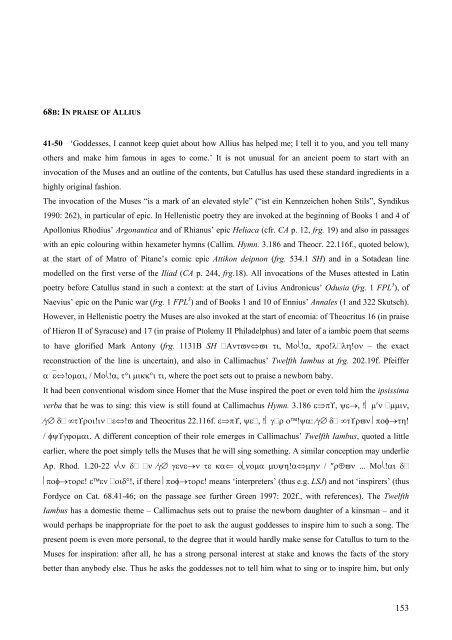CATULLUS 68 - Scuola Normale Superiore
CATULLUS 68 - Scuola Normale Superiore
CATULLUS 68 - Scuola Normale Superiore
You also want an ePaper? Increase the reach of your titles
YUMPU automatically turns print PDFs into web optimized ePapers that Google loves.
<strong>68</strong>B: IN PRAISE OF ALLIUS<br />
41-50 ‘Goddesses, I cannot keep quiet about how Allius has helped me; I tell it to you, and you tell many<br />
others and make him famous in ages to come.’ It is not unusual for an ancient poem to start with an<br />
invocation of the Muses and an outline of the contents, but Catullus has used these standard ingredients in a<br />
highly original fashion.<br />
The invocation of the Muses “is a mark of an elevated style” (“ist ein Kennzeichen hohen Stils”, Syndikus<br />
1990: 262), in particular of epic. In Hellenistic poetry they are invoked at the beginning of Books 1 and 4 of<br />
Apollonius Rhodius’ Argonautica and of Rhianus’ epic Heliaca (cfr. CA p. 12, frg. 19) and also in passages<br />
with an epic colouring within hexameter hymns (Callim. Hymn. 3.186 and Theocr. 22.116f., quoted below),<br />
at the start of of Matro of Pitane’s comic epic Attikon deipnon (frg. 534.1 SH) and in a Sotadean line<br />
modelled on the first verse of the Iliad (CA p. 244, frg.18). All invocations of the Muses attested in Latin<br />
poetry before Catullus stand in such a context: at the start of Livius Andronicus’ Odusia (frg. 1 FPL 3 ), of<br />
Naevius’ epic on the Punic war (frg. 1 FPL 3 ) and of Books 1 and 10 of Ennius’ Annales (1 and 322 Skutsch).<br />
However, in Hellenistic poetry the Muses are also invoked at the start of encomia: of Theocritus 16 (in praise<br />
of Hieron II of Syracuse) and 17 (in praise of Ptolemy II Philadelphus) and later of a iambic poem that seems<br />
to have glorified Mark Antony (frg. 1131B SH Αντϖν⇔ϖι τι, Μο⎝!α, προ!λ λη!ον – the exact<br />
reconstruction of the line is uncertain), and also in Callimachus’ Twelfth Iambus at frg. 202.19f. Pfeiffer<br />
α⎯ε⇔!ομαι, / Μο⎝!α, τ°ι μικκ°ι τι, where the poet sets out to praise a newborn baby.<br />
It had been conventional wisdom since Homer that the Muse inspired the poet or even told him the ipsissima<br />
verba that he was to sing: this view is still found at Callimachus Hymn. 3.186 ε⇒πϒ, ψε→, !⎜ μ′ν μμιν,<br />
⁄γ∅ δ ∞τϒροι!ιν ε⇔!ϖ and Theocritus 22.116f. ε⇒πϒ, ψε , !⎜ γ ρ ο!ψα: ⁄γ∅ δ ∞τϒρϖν ⎢ποφ→τη!<br />
/ φψϒγϕομαι. A different conception of their role emerges in Callimachus’ Twelfth Iambus, quoted a little<br />
earlier, where the poet simply tells the Muses that he will sing something. A similar conception may underlie<br />
Ap. Rhod. 1.20-22 ν⎝ν δ ν ⁄γ∅ γενε→ν τε κα⇐ ο⎣νομα μυψη!α⇔μην / ″ρ⊕ϖν ... Μο⎝!αι δ<br />
⎢ποφ→τορε! εεν οιδ°!, if there ⎢ποφ→τορε! means ‘interpreters’ (thus e.g. LSJ) and not ‘inspirers’ (thus<br />
Fordyce on Cat. <strong>68</strong>.41-46; on the passage see further Green 1997: 202f., with references). The Twelfth<br />
Iambus has a domestic theme – Callimachus sets out to praise the newborn daughter of a kinsman – and it<br />
would perhaps be inappropriate for the poet to ask the august goddesses to inspire him to such a song. The<br />
present poem is even more personal, to the degree that it would hardly make sense for Catullus to turn to the<br />
Muses for inspiration: after all, he has a strong personal interest at stake and knows the facts of the story<br />
better than anybody else. Thus he asks the goddesses not to tell him what to sing or to inspire him, but only<br />
153






